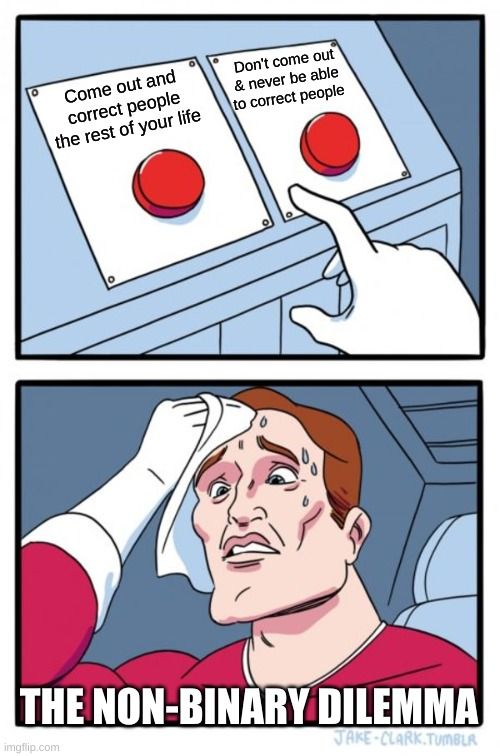The freedom of labels

I spend enough time living the reality of a non-binary person in a binary world, the last thing I want to do is listen to someone else sing about it. So instead I'm posting a poem by Alok Vaid-Menon. I don't have a video of them performing it (I looked, I promise). But here is the poem:
Grammar Lessons
"My first word was irony. Growing
up a boy, they called me too
feminine, when I finally claimed
femininity as my own, they
called me a man. These are
grammar lessons: some of us are
only allowed to be thought,
never to think.
When they insist that our pronouns
violate grammar to some degree they
are right. Grammar is less about
the mechanics of language, more the
monopoly of it. It's not just about
who can speak, but who gets to
speak. He who controls the word controls the world.
What they mean is: don't
object to remaining object.
You are not a subject
(unless you subject
yourself to me.)
In school we were taught that
basic sentence structure includes
a subject and a predicate. How
naive I was to believe that if you
just found the right words and put
them in the appropriate order it
would necessarily lead to understanding.
How devastating: meaning is not an
equal opportunity employer.
I studied so hard. I choreographed
my tongue to carve the inchoate
sounds of my soul into language.
What a tragedy to learn on the
other side. It doesn't matter if
you have all the right words when
they think you have the wrong body.
Subject. Predicate. Power. In order to be
understood, you must have power. What this
means is that we could both launch the
same words and they would still land in
different places. What this means is that
so often their words are prioritized more
than our lives. What this means is that
in order to understand us you must....wait.
I don't think I can express that here.
Meet me somewhere else.
The body is three-dimensional
language. Beauty is the harshest
editor. I could spend the rest of
my life articulating every detail,
every grain, every follicle. And
still they would not understand.
Because of what I look like. No:
because of what they feel about
what I look like.
A grammar lesson: if you were to
scream in outer space no one would
hear you. Sound waves can't travel
through an empty vacuum. Only you
would be able to hear yourself
because the sound waves would still
travel through your body.
This is what
it feels like
to be Brown,
Trans, Femme,
and Alive."
The first time I read the words in this poem- "It doesn't matter if you have the right words if they think you have the right body"- it just about broke me. Anyone who has struggled with identity, but particularly gender identity or sexual orientation, knows the feeling of finally having the "right" words. When you've spent your entire life up until that point not feeling "right" in one way or another, finding the right word is so important. And yet, it is often its own tragedy. When you realize the right word for you is one that most people won't agree with, ou face a whole new tragedy: be true to who you are and face a much harder life, or pretend to be someone else to feel accepted?
Something I notice often in conversations with cis/straight people is they will ask why labels are so important. "Why do we need to learn all these complex terms like non-binary, genderqueer, genderfluid, demiboy, queer, trans, cis, asexual, why so many labels?!?" Because labels are freeing. Isn't it ironic, in this unit on how interpretations of gender within social media are limiting, to be confronted with the idea that actually labels are freeing? Here's the rub: when a label does not fit you, and you know it (and everyone else probably picks up on it too), finding the right label that transports you outside of the previous category you were in is an extremely freeing thing. More labels means more choice.
"But isn't the ideal world one without labels?" Sure. That would be amazing. How do you propose we get there? If we started (in the western, imperial, supremacist world) with 2 gender labels: men and women, how do we go from 2 to none? Most people would think we subtract them, we abolish them. But we actually hav eot add to subtract. When we add in MORE labels, we are breaking those monopolies on gender up. And it therefore makes the categories of men and women get smaller, and smaller, until more and more people realize that they actually don't fit in those either. Pretty soon, there are many labels and many people in diverse categories. When we accostom ourselves to the idea that people can be OUTSIDE of these two labels, we become more comfortable with the idea that people get to decide who they are, and we can trust them. That means we can eschew the label and listen to people directly. See? More labels needs to less need for them overall.
(I feel I have addressed the five questions, even if indirectly, in my post above. I know I didn't label the questions specifically but I think I have addressed them. If something is missing please let me know).